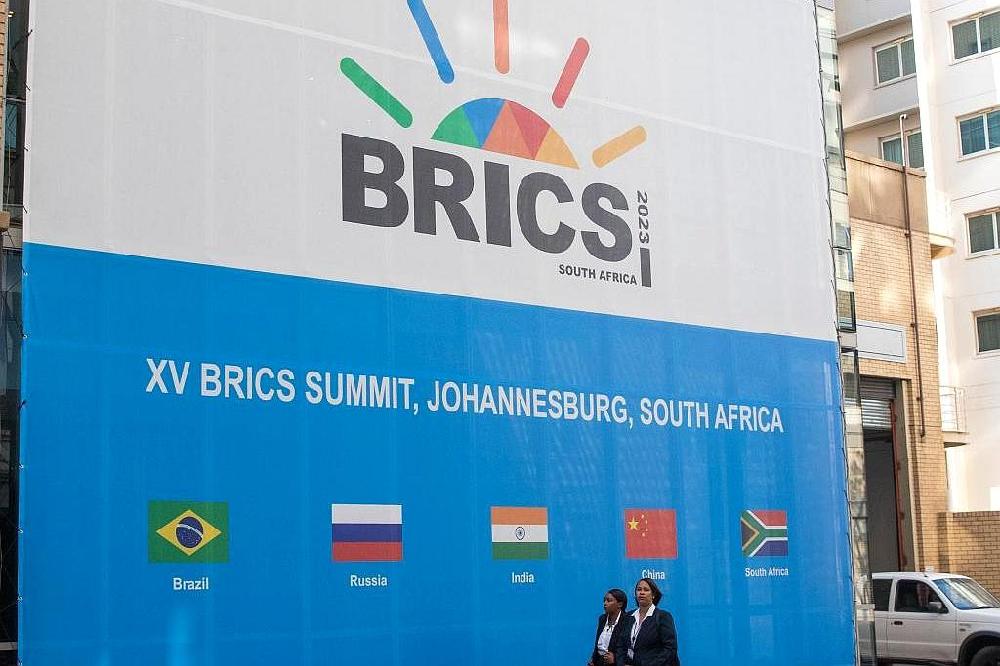
People walk near the venue of the 15th BRICS Summit in Johannesburg, South Africa, Aug. 21, 2023. [Photo/Xinhua]
The 15th BRICS Summit in Johannesburg has been a monumental success for the developing world. The grouping issued a historic declaration, and six new members have been invited to join its multilateral ranks. These include Argentina, Egypt, Ethiopia, Iran, Saudi Arabia, and the United Arab Emirates. Together, BRICS' substantial economic heft is even more likely to accelerate contributions to about 40% of global economic growth by 2028, while keeping the Global South at its core. Just as China said, "BRICS is an important force in shaping the international landscape. We choose our development paths independently, jointly defend our right to development, and march in tandem toward modernization."
BRICS' historic expansion prospects and significant traction with African states signal the sound and seamless advancement of developing world interests in global governance. China joins its partners in championing calls for greater financial integration among its ranks, building on a track record of win-win investments within and beyond Africa. That includes collective infrastructure and sustainable development support through the Shanghai-based New Development Bank (NDB).
The institution is now set to deliver even stronger incentives for infrastructure and sustainable financing solutions to the developing world, thanks in part to the nations remaining united in tone and building on billions in recent economic development financing. Past BRICS-African engagements have also put a premium on dialing up South-South participation in regional issues and demonstrated a welcome focus on increasing Africa's voice in trade, economic, and multilateral affairs – a major priority this year.
The inclusion of more economic and energy heavyweights within BRICS also reflects positively on the grouping's promise to champion "global consensus on economic policies" and push back against geopolitical fragmentation. For instance, Saudi Arabia and Iran's prospective inclusions add to the BRICS' cross-regional governance focus, enabling all sides to expand on "political and security cooperation" untethered to cold war mentalities.
The BRICS' stated support for dialing up financial trade through local currencies is also a profound advantage for scores of emerging economies committed to facilitating strong investment and trade flows. It is here that China's proposal for multisector cooperation strikes a common chord with South Africa, Russia, and other BRICS partners. All sides have vowed to scale up development opportunities across nations without letting rising debt levels or economic recovery stages hold back their shared future.
Africa's urgent economic and development challenges have long been ignored by the Western-dominated financial system, reputed for undermining the resource distribution and voting rights of emerging economies. This year's summit confirmed that the BRICS is here to position itself as a fair and integrative force for peace and stability in a divided world. "We reaffirm that openness, efficiency, stability, and reliability are crucial in tackling economic recovery challenges and boosting international trade and investment," read their joint declaration.
By giving local currency trade its due recognition, BRICS builds on recent bilateral breakthroughs between China, Brazil, and Russia to make alternative payment settlements a promising reality for burgeoning trade. Such arrangements have attracted significant support from other aspiring BRICS members and could serve as a launchpad for trade that has grown by leaps and bounds in recent years.
The message is clear: An expanding BRICS will work to overcome unwarranted barriers to free and fair trade that disproportionately affect the Global South. Small circles such as the G7 and exclusively Western-dominated blocs have shown few signs of plugging those trade access gaps, though the inclusion of more ranks strikes at the heart of BRICS' appeal as a multilateral force amid global divisions.
As China said, "BRICS countries gather not in a closed club or an exclusive circle, but a big family of mutual support and a partnership for win-win cooperation."
The added clout of six new members, local currency trade optimization, and developing world representation jointly underscore that collective action.
Hannan R. Hussain is a foreign affairs commentator, author and recipient of the Fulbright Award.
